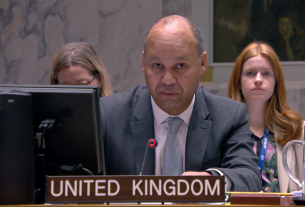As the global economy transitions towards sustainability, the need for strategic international collaborations in the green energy sector has never been more pressing. Countries like the United Kingdom (UK) and Qatar are leading the way in forming innovative partnerships to address the challenges of climate change, diversify their energy sources, and create long-term economic value. Their recent partnership to accelerate clean energy technologies and foster economic growth demonstrates the power of such alliances.
For Nigeria, Africa’s largest economy and one of the world’s largest oil producers, these international collaborations offer an unprecedented opportunity to diversify its economy, modernize its energy infrastructure, and create thousands of jobs in the growing green energy sector. The relationship between the UK and Qatar provides a compelling model for how Nigeria could benefit from similar partnerships with nations like the UK, France, the UAE, and Qatar itself. Here, we explore the inherent values of such alliances, showcasing how they could play out and generate mutual benefits for all parties involved. There is a very high risk of getting left behind in the ongoing and coming transitioning if these developments are not keenly followed and capitalized on by African countries.
The UK-Qatar Green Energy Partnership: A Model for Nigeria
In a groundbreaking development, the UK and Qatar have recently formed a strategic partnership aimed at advancing clean energy technologies. This partnership underscores the importance of collaboration between nations committed to a sustainable future, focusing on shared goals of decarbonization, economic diversification, and technological innovation.
The UK, with its advanced clean energy technologies in wind, solar, and hydrogen power, and Qatar, with its expertise in energy storage and sustainable fuel production, are joining forces to accelerate the global energy transition. The partnership is set to create thousands of skilled jobs in both the UK and Doha, driving innovation and increasing access to sustainable energy solutions.
For Nigeria, this partnership serves as a shining example of what is possible when nations with different strengths collaborate for mutual growth. With the right strategic alliances, Nigeria could see similar benefits, propelling the country into a new era of clean energy, economic diversification, and global leadership in sustainability.
The Value of Strategic Alliances for Nigeria
As Nigeria continues to rely heavily on its fossil fuel industry, the country faces a critical moment to pivot towards new, sustainable sectors. Strategic partnerships with countries like the UK, France, the UAE, and Qatar could unlock immense value and bring about far-reaching benefits across several key areas.
1. Access to Advanced Clean Technologies
The UK is renowned for its leadership in clean energy innovations, including offshore wind farms, solar energy, and green hydrogen technologies. By partnering with the UK, Nigeria could gain access to cutting-edge energy technologies that could help modernize its energy infrastructure and reduce its dependence on oil. Similarly, Qatar’s expertise in energy storage and clean fuel production offers Nigeria an opportunity to diversify its energy mix and improve energy security.
These collaborations would allow Nigeria to leapfrog traditional energy infrastructure development, bypassing the challenges that come with fossil fuel reliance. By bringing advanced technologies to Nigeria, these partnerships would significantly accelerate the country’s transition to a clean energy economy.
2. Job Creation and Economic Diversification
One of the most immediate benefits of such strategic alliances would be job creation. By integrating into the global green energy supply chain, Nigeria could create thousands of high-skilled jobs in areas such as renewable energy installation, green tech innovation, and energy infrastructure development.
The UK-Qatar partnership highlights the potential for job creation through green energy innovation. With strong investments in renewable energy projects, Nigeria could develop a thriving workforce in clean energy sectors, driving down unemployment and empowering the nation’s youth.
In addition, the partnerships could foster the development of local industries related to clean energy technologies. This would help diversify Nigeria’s economy away from oil, increasing the resilience of its industrial base and providing a sustainable foundation for future growth.
3. Foreign Direct Investment (FDI) and Infrastructure Development
Strategic partnerships with countries like Qatar and the UAE, known for their strong investment portfolios, would attract significant foreign direct investment into Nigeria’s green energy sector. Qatar, for example, has a history of making substantial investments in international infrastructure projects. If Nigeria aligns with such countries in the clean energy sector, it could secure much-needed funding to develop renewable energy plants, energy storage systems, and modernize its electrical grid.
These investments would not only bolster Nigeria’s energy infrastructure but also stimulate economic growth in other sectors. Reliable and affordable energy would enable industries ranging from agriculture to manufacturing to flourish, further diversifying Nigeria’s economy and increasing its competitiveness on the global stage.
4. A Platform for Global Leadership in Sustainability
Collaborating with forward-thinking countries like the UK, France, and Qatar would place Nigeria at the forefront of global efforts to tackle climate change. As these nations drive the agenda on decarbonization, Nigeria could become a key player in Africa’s green energy transition, exporting its renewable energy solutions to neighboring countries and positioning itself as a regional leader.
The UK-Qatar alliance serves as a prime example of how smaller and developing economies can contribute to global sustainability goals. Nigeria, with its vast land and natural resources, could become a critical partner in the fight against climate change, producing green energy solutions and participating in global carbon reduction efforts.
5. Mutual Benefits for All Parties
Strategic partnerships are inherently beneficial for all involved. The UK and Qatar’s collaboration aims to meet their own domestic climate goals while benefiting from access to each other’s markets and technologies. For Nigeria, a similar partnership could result in access to financial resources, technical expertise, and new markets for its own green energy products.
By diversifying its economy, Nigeria could position itself as an important player in the global green energy market, while its partners gain access to a growing African market with immense potential. This mutual exchange would not only strengthen Nigeria’s position but also create lasting economic ties and value for all parties involved.
Conclusion: The Path Forward for Nigeria
The UK-Qatar clean energy partnership highlights the vast potential of international collaborations in driving the green energy transition. For Nigeria, embracing similar strategic alliances with nations such as the UK, France, the UAE, and Qatar would offer an opportunity to modernize its energy infrastructure, create jobs, attract foreign investment, and position itself as a leader in the global green economy.
With the right partnerships and investments in clean technologies, Nigeria can unlock significant value, diversifying its economy and ensuring long-term sustainable growth. The time is now for Nigeria to seize the opportunity to transition into a green energy powerhouse, building a brighter future for its people and contributing to global sustainability efforts.


